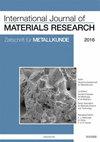Effect of laser energy density on surface morphology, microstructure and mechanical behaviour of direct metal laser melted 17-4 PH stainless steel
IF 0.7
4区 材料科学
Q4 METALLURGY & METALLURGICAL ENGINEERING
引用次数: 0
Abstract
Abstract The surface and microstructural characteristics of 3D printed parts play a significant role under mechanical loading. The authors have explored the effect of laser energy densities on the surface morphology, microstructure and mechanical behaviour of 17-4 precipitation hardened stainless steel fabricated under the direct metal laser melting technique. The considered processing parameters were laser energy density and its technical parameters: laser power, layer thickness, hatch spacing and scanning speed. The mechanical and metallurgical properties of the as-printed samples appeared better than the wrought counterpart due to the higher densification level (99.74 %) induced by the rotating scanning strategy. X‐ray diffraction revealed the presence of both the martensitic α phase and austenitic γ phase in the as-printed sample. There is no significant anisotropy in the mechanical behaviour as the build direction has a random texture with a fine columnar grain structure. The high laser energy density with low layer thickness results in an excellent surface finish. The tensile strength (1180 MPa) and the elongation for the as-printed sample (45.0 %) were considerably more significant than that for the wrought sample (1160 MPa and 26.0 %), which is attributed to the combination of low and high-angle boundaries, as confirmed by the electron backscatter diffraction results.激光能量密度对直接金属激光熔化17-4 PH不锈钢表面形貌、显微组织和力学行为的影响
3D打印零件的表面和微观结构特征在机械载荷作用下起着重要作用。研究了激光能量密度对金属直接激光熔化17-4析出硬化不锈钢表面形貌、显微组织和力学性能的影响。考虑的加工参数为激光能量密度及其技术参数:激光功率、层厚、舱口间距和扫描速度。由于旋转扫描的致密化程度(99.74 %)较高,印刷态样品的力学性能和金相性能均优于锻造态样品。X射线衍射结果表明,样品中存在马氏体α相和奥氏体γ相。由于构建方向具有具有细柱状晶粒结构的随机织构,因此力学行为没有明显的各向异性。激光能量密度高,层厚低,表面光洁度好。电子背散射衍射结果证实,打印态试样的拉伸强度(1180 MPa)和伸长率(45.0 %)明显高于变形态试样(1160 MPa和26.0 %),这是低角和高角边界共同作用的结果。
本文章由计算机程序翻译,如有差异,请以英文原文为准。
求助全文
约1分钟内获得全文
求助全文
来源期刊
CiteScore
1.30
自引率
12.50%
发文量
119
审稿时长
6.4 months
期刊介绍:
The International Journal of Materials Research (IJMR) publishes original high quality experimental and theoretical papers and reviews on basic and applied research in the field of materials science and engineering, with focus on synthesis, processing, constitution, and properties of all classes of materials. Particular emphasis is placed on microstructural design, phase relations, computational thermodynamics, and kinetics at the nano to macro scale. Contributions may also focus on progress in advanced characterization techniques. All articles are subject to thorough, independent peer review.

 求助内容:
求助内容: 应助结果提醒方式:
应助结果提醒方式:


